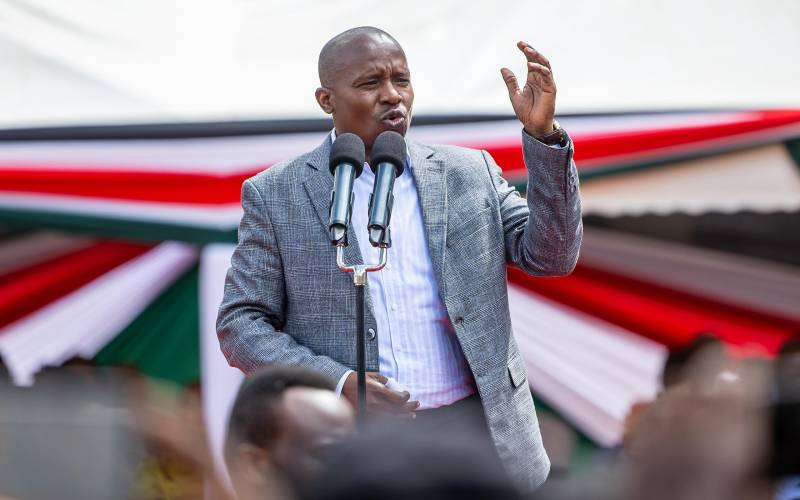Deputy President Kithure Kindiki has pledged to engage Wiper party leader Kalonzo Musyoka to ease political tensions within the central region.
Speaking during an Economic Empowerment Programme in Mutomo, Kitui South, on Thursday, Kindiki emphasised that this initiative aims to promote unity in the Ukambani region.
“Between me and that other guy, who is Kalonzo’s true brother? Between me and that other fellow, who can direct Kalonzo on the right path and not mislead him into politics of empty rhetoric without any meaningful development for the people of Ukambani and Kenya?” Kindiki questioned the crowd.
He reassured the audience that he would never mislead Musyoka, implying that he had been led astray by other opposition leaders.
“Kalonzo is my neighbour. He is my brother. He is a lawyer like me. Therefore, I cannot lead Kalonzo into a ditch. I will look for him, talk to him, and we will eventually agree. I respect Kalonzo; that is why you’ll not hear me abusing or demeaning him. He is my brother…” Kindiki affirmed amid cheers from the crowd.
Legislators accompanying him, along with the public, encouraged him to reach out to Musyoka for the betterment of the region.
He also condemned tribal politics, describing it as “foolish politics,” and urged Kenyans to embrace unity.
“We don’t want to waste time with people who have politics here in Upumbavu—politics of the tribe. Where will this tribe take you? Some of our people live in Mombasa, Lamu, Garissa, Eldoret, Taveta, and Hola. That is their home,” he added.
In addition, Kindiki emphasised the government’s commitment to addressing corruption and tax evasion rather than placing additional burdens on ordinary citizens.
“We have not put a single cent anywhere. There is no new taxation. As it was, that is what it will be. We are not adding any new taxes,” he stated.
The Deputy President also noted that the national budget focuses on tightening enforcement around tax compliance, particularly targeting high-income earners and business operators who have historically avoided paying taxes.
Deputy President Kithure Kindiki has pledged to engage Wiper party leader Kalonzo Musyoka to ease political tensions within the central region.
Speaking during an Economic Empowerment Programme in Mutomo, Kitui South, on Thursday, Kindiki emphasised that this initiative aims to promote unity in the Ukambani region.
“Between me and that other guy, who is Kalonzo’s true brother? Between me and that other fellow, who can direct Kalonzo on the right path and not mislead him into politics of empty rhetoric without any meaningful development for the people of Ukambani and Kenya?” Kindiki questioned the crowd.
He reassured the audience that he would never mislead Musyoka, implying that he had been led astray by other opposition leaders.
“Kalonzo is my neighbour. He is my brother. He is a lawyer like me. Therefore, I cannot lead Kalonzo into a ditch. I will look for him, talk to him, and we will eventually agree. I respect Kalonzo; that is why you’ll not hear me abusing or demeaning him. He is my brother…” Kindiki affirmed amid cheers from the crowd.
Legislators accompanying him, along with the public, encouraged him to reach out to Musyoka for the betterment of the region.
He also condemned tribal politics, describing it as “foolish politics,” and urged Kenyans to embrace unity.
“We don’t want to waste time with people who have politics here in Upumbavu—politics of the tribe. Where will this tribe take you? Some of our people live in Mombasa, Lamu, Garissa, Eldoret, Taveta, and Hola. That is their home,” he added.
In addition, Kindiki emphasised the government’s commitment to addressing corruption and tax evasion rather than placing additional burdens on ordinary citizens.
“We have not put a single cent anywhere. There is no new taxation. As it was, that is what it will be. We are not adding any new taxes,” he stated.
The Deputy President also noted that the national budget focuses on tightening enforcement around tax compliance, particularly targeting high-income earners and business operators who have historically avoided paying taxes.
By Daren Kosgei


